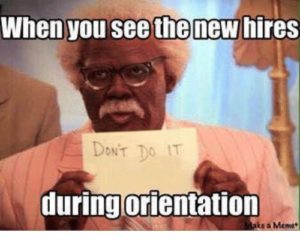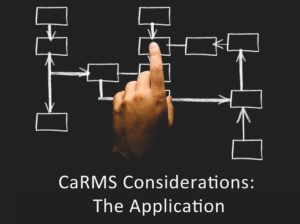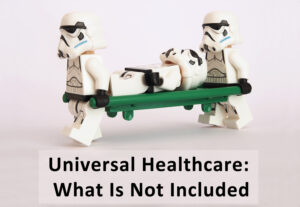Disclaimer: I am not an expert in residency programs. I also do not have superpowers with regards to admission to residency programs in Canada. Obviously. What I write in this post is based on the process that I used (back in the day!) and what I generally would talk about with medical students
This is a three-part series inspired by a recent set of conversations with some medical students, and is really geared towards the medical student thinking about going through the Canadian residency matching system. Of course, everyone is welcome to read!
Note: there is a glossary of terms at the bottom of the post for any readers for whom some of the terms are new.
This post is a follow up to the one on the CaRMS application strategy.
Evaluating the Program
This might be an interesting concept to consider for those who feel that they are desperate for a residency spot and would be so happy if someone would take them.
Residency programs want to impress you too.
So, feel free to prepare a stash of questions for the program, and don’t be scared to ask the hard ones! Shows interest. (Be polite still, of course).
With 10 interviews, I was worried about keeping some schools straight.
So, I did what I always do.
I took notes and then I made spreadsheets for comparison from those notes.
From my old notes, I’ve assembled some items to consider for a medical student contemplating CaRMS. Presumably, you, the medical student, have already considered various programs and why you might want to be in a particular location or program. These are some other things to think about on top of those greater considerations.
In no specific order:
Salary to Cost-of-Living
Residents are paid a salary based on what their resident association negotiates with the province. The CaRMS website offers a break down of what this looks like. The salary is the same no matter where you are in the province. This has financial implications. A resident is going to have much more leeway with their salary living in Thunder Bay than if that same resident was in downtown Toronto.
Off-Service Rotations
The College of Family Physicians Canada (for Family Medicine residents) and the Royal College of Physicians and Surgeons of Canada (for all other specialty residents) set Canada-wide standards for training. There might be some variation in terms of access to sub-subspecialists or breadth of experience, but training is generally good no matter where you go.
The main differences that I noticed in curriculum were the rotations. In particular, the types of off-service rotations one might be required to do and when varied from school to school. Another difference is block style rotations vs. longitudinal rotations.
Research Project and Funding
Some sort of research project is required during residency, and I think programs generally offer protected time for this. Programs can vary in terms of what they expect from residents in terms of research project(s) and presentations over the course of the residency program. Programs can also vary in the amount of protected time they offer. Lastly, research funding also varies widely from school to school. These are things worth asking about if the information is not spontaneously offered!
Conference Days and Funding
More of a fun thing – do inquire about protected conference days and conference funding. These vary from program to program, and across specialties.
Call
Eh, call. What can you do. Hospital’s gotta run at all hours of the night, and residents and medical students are a big part of what makes this happen. Check into call frequency, structure, and intensity in terms of patient volumes. See if you can get a feel for the culture of call. And if it’s anything like this Gomerblog post poking fun at PM&R call, sign the heck up!

Any Special Points the School is Proud Of
This is pretty self-explanatory. See what the unique points are about this school. What do they volunteer to tell you? That will help elicit some of the school’s values.
How Happy Are the Residents?
Possibly the most important point to consider. You want to know if you’re joining a generally content bunch or a generally discontented bunch. The CaRMS social (usually a dinner pre- or post-interviews) can be a helpful place for sussing this out. Interactions with residents throughout the interview day or half-day is another place to get a feel for this.

Summary:
When it comes time to interview the schools (the same time, of course, that the schools are interviewing you), keep some of these other factors in mind:
- Salary to Cost-of-Living
- Off-Service Rotations
- Research Project and Funding
- Conference Days and Funding
- Any Special Points the School is Proud Of
- Call Frequency, Structure and Intensity
- Resident Body Happiness
One Last Thing
Trust your gut.
If the school checks off only part of your checklist of things, but you’ve got a really good feeling about it, trust your gut instincts. Your mind is noticing something in the periphery that you’re not consciously processing, and is prodding you in a particular direction.
Needless to say, if the school checks off a bunch of things on the checklist but doesn’t feel right (or even worse, feels wrong!) then turn around and don’t look back. If you ignore your gut…you will probably regret it.

In the next and last post in the series, we will talk about some CaRMS travel and spending specific advice!
Until next time,
-Dr. FIREfly
Glossary of Terms
CaRMS: Canadian Residency Matching Service. It is used to represent both the process of going through interviews at different residency programs as well as the computer algorithm that takes everyone’s choices and spits out an answer on “Match Day” of where hundreds of medical students are going to go to spend the next 2-5+ years of their lives. CaRMS essentially – though not fully – determines your future path as a physician in terms of what field you go into, where you might end up working for your career, what sort of compromises you might have to make in your personal relationships due to upcoming distance…lots of things. It influences all aspects of your life for the next however-many-years the residency program is.
Residency: the next part that usually comes after medical school (although some people might insert a Masters of Business Administration, Masters of Public Health, Masters of Education, research fellowship or PhD somewhere in the middle). The shortest is 2 years (Family Medicine), and longest is 6 years (Neurosurgery), and most other programs are about 5 years. That is, of course, if you don’t do a fellowship (or two or three) on top of your residency in the dash to try to get a job once you’re out the other end.
Off-Service Rotations: mandatory rotations during residency training where one is not working in the capacity of the residency program one is in. Example: Anesthesia resident doing an off-service rotation on Obstetrics/Gynecology





